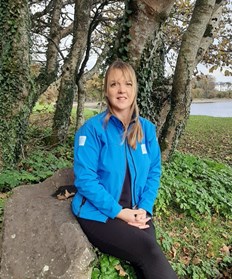
Yvonne McMonagle
Yvonne McMonagle relishes a challenge and her career with Irish Water as a water compliance analyst certainly keeps her busy. The role involves close collaboration with local authorities, the Health Service Executive (HSE) and the Environmental Protection Agency (EPA) and brings with it a lot of responsibility.
“Public health is our number one priority and it is our job to ensure that all water that flows through the public water supply is compliant with all Irish and EU regulations and is safe to drink,” explains Yvonne in simple terms.
But there is nothing simple about water compliance. “Water treatment is essential to reduce or remove contaminants so water is safe to drink. Contaminants may include sediments and pathogens such as bacteria, viruses and protozoa; or other chemical parameters such as herbicides, pesticides and heavy metals. Contamination can also occur in the form of pollutants from farming such as spreading of slurry, the use of MCPA and Glyphosate for rush control all of which are problematic and expensive to treat at water treatment plants,” she explains.
Confused? You have a right to be because this is a complicated role and one which requires attention to detail and a vast knowledge on a range of subject matters.
A current hot topic after the publication of the EPA’s Public Water Supplies Drinking Water Quality 2018 report is the increase in the detections of cryptosporidium in public water supplies that has resulted in Boil Water Notices put in place at different water supply zones nationally.
E. coli is another common bacteria that can be detected in water supplies if not removed within the treatment process or if there is inadequate disinfection within our water distribution network.
You will also hear a lot of talk about trihalomethanes (THMs). Yvonne explains further: “All public water supplies need to be disinfected to make sure the water is safe to drink. Chlorine is used by Irish Water to disinfect drinking water. Water that has not been properly disinfected, has a risk of serious and possibly life-threatening illness.
“An effect of using chlorine is that chemical compounds called trihalomethanes can form over time. This happens when chlorine reacts with natural organic matter (tiny remaining particles of dirt, twigs, leaves and so on) in the water.
“The amount of THMs in a supply depends on a few things - after heavy rain, there is more organic matter entering the treatment plant; when there is more organic matter, chlorine in the water has a longer time to react with the matter and create THMs; when it is warm or we need to use more chlorine.”
Irish Water is taking action to remove the risk of THMs forming in affected water supplies by improving the treatment plant and the water distribution network. My home county has seen huge investment from Irish Water over the past few years with the construction of state of the art water treatment plants at Owenteskna, Gortahork/Falcarragh, Rathmullan, Creeslough and Letterkenny which has already improved THM compliance.
There is no conclusive scientific evidence which links THMs in drinking water and cancer. More information on this can be found on the HSE website or the EPA website. There is also a joint position paper on THMs written by the HSE and the EPA.
Not disinfecting water sufficiently presents a far higher and more immediate risk to human health.
Science is critical to Yvonne’s role because her education and experience have given her the tools to interpret drinking water quality test results under a number of headings including microbiological, chemical and others. It is Yvonne’s responsibility to ensure these tests are correctly interpreted and when an issue arises that could jeopardise public health she has the experience and training to advise what actions must be taken which are done in consultation with the HSE and EPA.
Yvonne explains further: “If water sampling results show up an issue there are several tasks that are taken. Where drinking water does not meet acceptable standards, Irish Water immediately notify the EPA.
“If the water quality is impacted, Irish Water then consult with the HSE and appropriate actions are agreed. If there is an immediate risk to public health following this consultation, this can result in a Boil Water Notice or a Do Not Consume notice being placed immediately on the scheme. However, it is important to note that not every elevated level reported above a standard is an immediate risk to health. But it does often indicate that there may be an improvement required to the treatment process at the water treatment plant. Where deemed necessary, the EPA place the scheme on their Remedial Action List and Irish Water is required to submit an action plan to remove the risk, for approval by the EPA.”
Yvonne joined Irish Water in 2016. She is responsible for reviewing and analysing all regulatory drinking water quality results across Donegal, Cavan and Monaghan. Prior to moving to Irish Water, she worked in Jennings O’Donovan & Partners for 11 years in their water and wastewater department working primarily on local authority schemes, water abstraction orders, wind farm environmental impact statements, hydrology reports, wastewater discharge licence application.
She has experience in carrying out river water sampling and reviewing and analysing results in accordance with licensing compliance. She has prepared industry reports, managed wastewater discharge licence and certificate applications as well as water sampling and analysis and mapping. You could say she knows the industry inside out having worked on all aspects of it which has set her up nicely for her current role.
In order to achieve the qualifications to carry out this range of work Yvonne studied at the University of Bedfordshire in England and obtained an honours degree in Environmental Management.